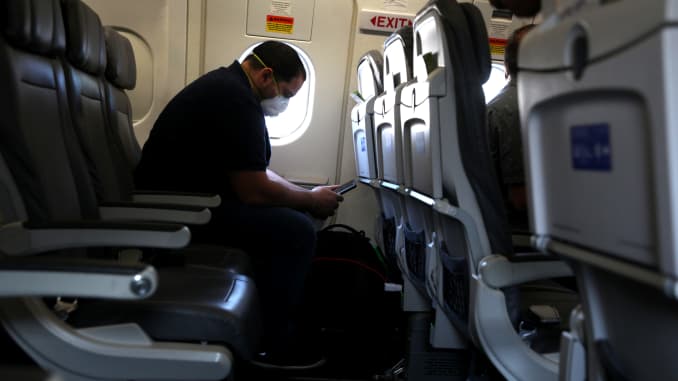- The Department of Transportation said complaints from consumers about airline refunds have surged amid the coronavirus outbreak.
- The DOT again issued guidance on who’s entitled to a cash refund versus a voucher.
- Airlines have implemented new policies like face masks for passengers during the pandemic.

The Department of Transportation said Tuesday that it has received thousands more complaints over airline refunds than usual during the coronavirus pandemic and issued another warning to carriers who skirt their obligations to customers.
“The Department has received an unprecedented volume of complaints from passengers and is examining this issue closely to ensure that airlines’ policies and practices conform to DOT’s refund rules,” Transportation Secretary Elaine Chao said in a news release. “The Department is asking all airlines to revisit their customer service policies and ensure they are as flexible and considerate as possible to the needs of passengers who face financial hardship during this time.”
The department said it usually receives about 1,500 air travel complaints and questions in a typical month but that has surged to more than 25,000 in April and May, “many of which concern refunds.”
The agency in April warned airlines that they have to offer refunds, not just vouchers, for flights that carriers cancel or significantly change. “Because ‘cancellation’ and ‘significant change’ are not defined in the context of ticket refunds, airlines may develop reasonable interpretations of those terms,” but the government “expects carriers to honor those reasonable interpretations in implementing their refund obligations,” the DOT said.
Airlines have slashed their schedules to get closer to current passenger levels, which are currently down some 90% on the year, according to federal data. Passengers who bought nonrefundable tickets usually don’t get a refund or travel voucher if the flight is still operating and the schedule hasn’t been significantly changed, the DOT said.
“This is true even if the passenger wishes to change or cancel due to concerns related to the COVID-19 public health emergency,” the agency said.
Cash refunds for all travelers who cancel their trips could push carriers toward bankruptcy, Nick Calio, president of Airlines for America, a lobbying group that represents American, Delta, United and other large U.S. carriers, said at a Senate hearing last week.
“We follow and comply with federal law and regulations on this matter. Accordingly, when carriers cancel a flight a refund is offered,” A4A said. “U.S. airlines remain committed to making accommodations that are responsive to travelers’ needs during this unprecedented time.”
In addition to sharp reductions to their flights, airlines have also implemented a number of new policies aimed at protecting travelers and crew members and to address concerns about flying during the pandemic.
Airlines over the past week have started mandating that both passengers and crew members must wear face masks on board and encouraged them to use them in the airport as well.
The Federal Aviation Administration and the Centers for Disease Control and Prevention have published recommendations about travel during the pandemic but some lawmakers and labor unions say that they don’t go far enough and that the government should should issue rules to protect customers and employees.
“Airlines are implementing policies on the fly with essentially no coordination or direction from the federal government,” Sara Nelson, president of the Association of Flight Attendants, which represents roughly 50,000 cabin crew members at 19 airlines. “We need a federal plan of action to implement safety measures on masks, social distancing, cleaning, and more.”
Dennis Tajer, an American Boeing 737 captain and spokesman for the Allied Pilots Association, which represents the Fort Worth, Texas-based airline’s roughly 15,000 pilots, said that when the plane “door closes that’s our own little world and we don’t do well when we have less than definitive rules.”
American Airlines, whose face covering policy went into effect on Monday, told pilots and flight attendants that gate agents can deny boarding to travelers who don’t wear a face mask but that there are exemptions such as if a passenger has a medical issue or is a child who can’t keep a mask on.
“Once on board and off the gate, the face covering policy will become more lenient,” American told its pilots. “The flight attendant’s role is informational, not enforcement, with respect to the face covering policy.”
American told its flight attendants to advise customers about the policy and that if they had health, age, religious or other reason not to wear one no other action would be needed. It added that if “the customer chooses not to comply for other reasons, please encourage them to comply, but do not escalate further. Likewise, if a customer is frustrated by another customer’s lack of face covering, please use situational awareness to de-escalate the situation.”
United has a similar policy and reasoning for when a passenger isn’t mandated to wear a mask.
If the traveler “falls outside these categories yet still refuses to wear a face covering, the customer service agent would pull them aside to further understand their concerns and discuss options,” United said in a statement. “This would include things like moving them to a new seat where they could maintain a safe social distance from other passengers. Because the safety of our passengers and employees is our top priority, there could be an isolated situation where a customer may be denied boarding as a last resort, but this would be handled on a case by case basis.”